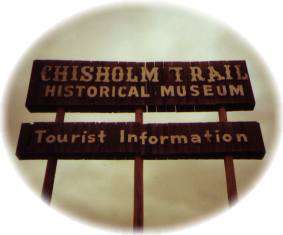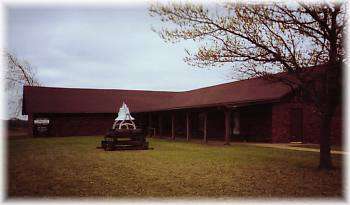OKHS Chisholm Trail Historical Museum
category : Museums
 The history of the Chisholm Trail is more than the story of range-tough cowboys, stampeding cattle, and rowdy cowtowns. It is also the story of a people successfully adapting to the political, social, and economic changes brought on by our nation's most devastating conflict - the Civil War. Through artifacts and photographs the Chisholm Trail Historical Museum tells the story of the trail and the people associated with it. The Chisholm Tracker Marker is located at the site.
The history of the Chisholm Trail is more than the story of range-tough cowboys, stampeding cattle, and rowdy cowtowns. It is also the story of a people successfully adapting to the political, social, and economic changes brought on by our nation's most devastating conflict - the Civil War. Through artifacts and photographs the Chisholm Trail Historical Museum tells the story of the trail and the people associated with it. The Chisholm Tracker Marker is located at the site. In addition, the museum provides a glimpse into the early days of the Waurika Community.
The Beginning of an Industry - At the close of the Civil War in 1865, the greatest economic asset of Texas rested in vast hers of half-wild longhorn cattle. Locally, a longhorn was worth about $3 to $5, but in the cities of the North and East, the same steer would sell for $35 to $40. Economic conditions were right, but transportation was a problem. No railroads connected Texas to the East, and steamships were unsuitable for shipping the half-wild cattle.
In an effort to market the cattle, TEXANS BEGAN DRIVING THEIR HERDS THROUGH THE EASTERN PARTS OF INDIAN Territory to shipping points in Missouri and eastern Kansas. This route proved unsatisfactory primarily because farmers along this passage, know as the Shawnee Trail, feared the loss of their livestock to "Texas fever," a disease transmitted by ticks carried on the Texas cattle. In an effort to stop Texas cattle from entering the area strict laws were passed to limit importation.
The Cowtown - Joseph McCoy, an Illinois cattle dealer, realized that the problem of transportation could be solved by establishing a cattle trading center west of the line of settlement. In 1867, McCoy choose as the site of his venture the small prairie town of Abilene, Kansas, located on the Kansas Pacific Railroad. At Abilene McCoy constructed loading pens for the cattle and lodgings for the cattlemen. He then sent word that he would purchase all the Texas cattle that could be driven north.
The Trail - The Texans chose as the shortest and easiest route to Abilene a military trail first opened by the Delaware scout, Black Beaver, in 1861. This trail was also used as a trade route by the mixed-blood Cherokee trader, Jesse Chisholm. Although not a cattleman, Chisholm became a well-known figure on the trail and eventually the route north became known as "Chisholm Trail." Roughly paralleling the later route of U.S. Highway 81, the Chisholm Trail entered the Indian Territory near the present-day town of Terral, Oklahoma. It then passed through the future townsites of Duncan, Chickasha, El Reno, Kingfisher, Hennessey, and Enid before entering Kansas near Medford. The trail was not exact as the drovers often varied the route to avoid swollen streams or take advantage of good grazing.
As word of the new trail spread among the Texas cattlemen its use increased. In 1867, the first year the trail was used, McCoy shipped 35,000 head of cattle from Abilene. The next year the number increased to 75,000. By the late 1880s an estimated 3 million cattle had been driven from Texas to the cowtowns of Kansas.
Decline of the Trail - Activity over the Chisholm Trail peaked during the early 1870s, but by 1874 many drovers were moving their cattle over the Great Western Trail which passed through the Indian Territory Farther west. By 1889 the Chisholm Trail was abandoned altogether, the victim of westward moving settlement.
By the 1890s railroads had been constructed north and south through the Indian Territory, eliminating the need for the long drive, and signaling the end of the open range and the beginning of agricultural pursuits.
Admission: FREE ADMISSION
Hours: Thursday - Saturday, 10:00 am to 4:00 pm
Sunday, 1:00 to 4:00 pm
CLOSED: 1st Sunday of the Month and State Holidays
Address: East of intersection of U.S. Highways 81 and 70
Phone: 580-228-2166
Come visit us in Waurika, Oklahoma